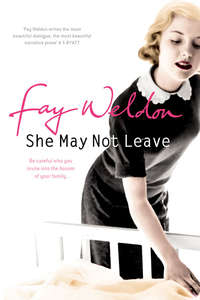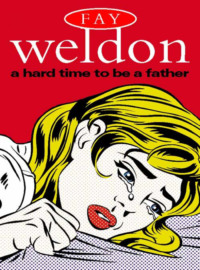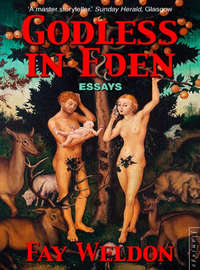
Полная версия
Puffball
‘Came up to see if you were all right,’ said Tucker.
‘I’m fine,’ said Liffey. She felt faint: surely because she had got up so suddenly. She leaned against the wall, heavy-lidded. She remembered her dream.
‘You don’t look it,’ said Tucker. He took her arm; she trembled.
‘How about a cup of tea?’ said Tucker. He sat squarely at the kitchen table, and waited. His house, his land, his servant. Liffey found the Earl Grey with some difficulty. Richard and she rarely drank tea.
‘It’s very weak,’ said Tucker, staring into his cup. She had not been able to find a saucer and was embarrassed.
‘It’s that kind of tea,’ said Liffey.
‘Too bad Hubby didn’t come home,’ said Tucker. ‘I wouldn’t miss coming home to you. Do you like this tea?’
‘Yes.’
‘I don’t,’ said Tucker. He stood up and came over to stand behind her, pinioning her arms. ‘You shouldn’t make tea like that. No one should.’
His breath came warm and familiar against her face. She did not doubt but that the business of the dream would be finished. His arms, narrowing her shoulders, were so strong there was no point in resisting them. It was his decision, not hers. She was absolved from responsibility. There was a sense of bargain in the air: not of mutual pleasure, but of his taking, her consenting. In return for her consent he offered protection from darkness, storm and fire. This is country love, thought Liffey. Richard’s is a city love: Richard’s arms are soft and coaxing, not insistent: Richard strikes a different bargain: mind calls to mind, word evolves word, response evokes response, is nothing to do with the relationship between the strong and the weak, as she was weak now, and Tucker strong upon her, upon the stone floor, her coat fortunately between her bare skin and its cold rough surface, his clothing chafing and hurting her. Tucker was powerful, she was not: here was opposite calling to opposite, rough to smooth, hard to soft, cruel to kind—as if each quality craved the dilution of its opposite, and out of the struggle to achieve it crested something new. This is the way the human race multiplies, thought Liffey, satisfied. Tucker’s way, not Richard’s way.
But Liffey’s mind, switched off as a pilot might switch off manual control in favour of automatic, cut back in again once the decision of abandonment had been made. Prudence returned, too late. This indeed, thought Liffey, is the way the human race multiples, and beat upon Tucker with helpless, hopeless fists.
It was the last day of her period. Surely she could not become pregnant at such a time? But since she had stopped taking the pill her cycle was erratic and random: what happened hardly deserved the name of ‘period’: she bled for six days at uneven intervals, that was all. Who was to say what was happening in her insides? No, surely, surely, it would be all right, must be all right; even if it wasn’t all right, she would have a termination. Richard would never know: no one would ever know.
She was worrying about nothing: worrying even as she cried out again in pleasure, or was it pain: Tucker now behind her, she on her side, held fast in his arms. They were like animals: she had not cared: now she began to: she wanted Richard. Where was Richard? If he hadn’t missed his train none of this would have happened. Richard’s fault. It could not happen again: it must not happen again: she would have to make clear to Tucker it would not happen again: so long as he understood what she was saying, peasant that he was. Even as she began to be horrified of him he finished, and whether she was satisfied or not she could not be sure. She thought so. It was certainly a matter of indifference to Tucker. He returned to the table and his cold tea. He wanted the pot filled up with boiling water. She obliged in silence, and poured more.
‘I suppose you could develop a taste for it,’ he said. ‘But I’d better be getting back to Mabs.’
He left. Liffey went back to bed, and to sleep, and the sleeping pills caught up with her and it was two in the afternoon before she woke again, and when she did, the dream of Tucker and the actuality of Tucker were confused. Had it not been for the state of her nightshirt and the grazing on her legs and the patches of abraded roughness round her mouth, she would have dismissed the experience altogether as the kind of dream a woman dreams when she sleeps alone for the first time in years. But she could not quite do that.
Liffey balanced the incident in her mind against Richard’s scuffling with his secretary at the office party, and decided that the balance of fidelity had been restored. There was no need to feel guilty. At the same time there was every reason not to let it happen again. She had the feeling Tucker would not return, at any rate not in the same way. He had marked her, that was all, and put her in her proper place. She felt sure she could rely upon his discretion. She was even relieved. Now that Richard had been paid out, she could settle down to loving him again. She felt she had perhaps been angrier with him than she had thought.
‘Well?’ enquired Mabs, when Tucker returned. The children were off on the school bus. Eddie had a bruise on his back. She had given him a note to take to his teacher saying he had a sore foot and could he be excused physical training, which was done in singlet and pants.
‘Skinny,’ complained Tucker. ‘Nothing to it.’
She pulled him down on top of her, to take the taste of Liffey out of him as soon as possible.
‘Not like you,’ said Tucker. ‘Nothing’s like you.’
‘But we’ll get the cows in her field,’ Mabs comforted herself.
‘We’ll get whatever we want,’ said Tucker. He felt the distress in her and kissed her dangerous eyes closed, in case the distress should turn to anger, and sear them all. ‘She’s just a little slut,’ said Mabs. ‘I knew she was from the way she talked. Don’t you go near her again, Tucker, or I’ll kill you.’
He thought he wouldn’t, because she might.
If he’d been a cockerel, all the same, he’d have crowed.
Taking and leaving Liffey. He liked Liffey.
Mabs asked Carol, later, if she knew what it was her mother mixed in with the mistletoe, and Carol said no, she didn’t. But whatever it was, it had got her Dick Hubbard.
‘It’s not that I believe in any of mother’s foolery,’ said Carol, ‘any more than you do. It’s just that it works. At least to get things started. It would never get a river flowing uphill—but if there’s even so much as a gentle slope down, it sure as hell can start the flood.’
In Richard’s Life
Richard, taking Bella’s words to heart, if not her body to his, went round to the apartment before going to work, to explain to Mory and Helen that a mistake had been made, and that he and Liffey would have to return to London. Liffey, Richard had decided, would have to put up with using Honeycomb Cottage as a weekend retreat, and he would have to put up with her paying for its rent—not an unpleasant compromise for either of them—until his verbal contract with Dick Hubbard, to take the cottage for a year, could be said to have expired. ‘Never go back on a deal just because you can,’ Richard’s father had instructed him, ‘even if it’s convenient. A man’s word is his bond. It is the basis on which all civilisation is based.’ And Richard believed him, following the precept in his private life, if not noticeably on his employers’ behalf.
‘Never let a woman pay for herself,’ his mother had said, slipping him money when he was nine, so he could pay for her coffee, and confusion had edged the words deeply into his mind. ‘Never spend beyond your income,’ she would say, ‘I never do,’ when he knew it was not true.
Now he earnestly required Liffey to live within his income whilst turning a blind eye to the fact that they clearly did not: that avocados and strawberries and pigskin wallets belonged to the world of the senior executive, not the junior. The important thing, both realised, was to save face. She seriously took his housekeeping, and he seriously did not notice when it was all used upon one theatre outing.
It was difficult, Richard realised on the way up the stairs, to fulfil the obligation both to Dick Hubbard and to Mory, who had been promised a pleasant apartment and who now must be disappointed. It could not, in fact, be done; and for this dereliction Richard blamed Liffey. He resolved, however, out of loyalty to a wife whom he had gladly married, to say nothing of all this to Mory.
The familiar stairs reassured him; the familiar early morning smells of other people’s lives: laundry, bacon, coffee. The murmur of known voices. This was home. Three days away from it and already he was homesick. He could never feel the same for Honeycomb Cottage, although for Liffey’s sake he would have tried. Wet leaves, dank grass and a sullen sky he could persuade himself were seasonal things: but the running, erratic narrative of the apartment block would never be matched, for Richard, by the plodding, repetitive story of the seasons.
I am a creature of habit, said Richard to himself.
‘I am a creature of habit!’ Richard’s mother had been accustomed to saying, snuggling into her fur coat, or her feather cushion, eyes bright and winsome, when anyone had suggested she do something new—such as providing a dish on Tuesday other than shepherd’s pie, or getting up early enough in the morning to prepare a packed lunch for Richard, or going somewhere on holiday other than Alassio, Italy. ‘I am a creature of habit!’ Perhaps, Richard thought now, one day I will understand my mother, and the sense of confusion will leave me.
Richard knocked on his own front door. Helen’s sister Lally, pregnant body wrapped in her boyfriend’s donkey-jacket, opened the door. She wore no shoes. Richard, startled, asked to see Mory or Helen.
‘They’re asleep,’ said Lally. ‘Go away and come back later whoever you are,’ and she shut the door in his face. She was very pretty and generally fêted, and saw no need to be pleasant to strange men. She believed, moreover, that women were far too likely for their own good to defer to men, and was trying to stamp out any such tendency in herself, thus allying, most powerfully, principle to personality.
Richard hammered on the door.
‘This is my home!’ he cried. ‘I live here.’
Eventually Mory opened the door. Richard had not seen Mory for three months. Then he had worn a suit and tie and his hair cleared his collar. Now, pulling on jeans, hopping from foot to foot, hairy chested, long haired, he revealed himself as what Richard’s mother would describe as a hippie. ‘Don’t lose your cool, man,’ said Mory. ‘What’s the hassle?’
‘Is that really you?’ asked Richard, confused more by the hostility in look and tone, than by the change in Mory’s appearance, marked though it was.
‘So far as I know,’ said Mory, cunningly.
He did not ask Richard in. On the contrary, he now quite definitely blocked the door, and Richard, who had just now seen himself as a knight errant, was conscious of a number of shadowy, barefoot creatures within, and knew that his castle had been besieged, and taken and was full of alien people, and that only force of arms would win it back.
Richard explained. He was cautious and formal.
‘That’s certainly shitsville, man,’ said Mory, ‘but it was on your say-so we split, and our pad’s gone now, and what are we supposed to do, sleep on the streets to save you a train journey? Didn’t you see Lally was pregnant?’ Richard said he would go to law.
Mory said Richard was welcome to go to law, and in three years time Richard might manage an eviction.
‘We’ve got the law tied up, man,’ said Mory. ‘It’s on the side of the people, now. You rich bastards are just going to have to squeal.’
Mory’s language had changed, along with his temperament. Richard remarked on it to Miss Martin, when he reached the office. He was already on the phone to his solicitor.
‘He may have been popping acid,’ remarked Miss Martin. ‘Or he may have been like that all the time. People’s true natures reveal themselves when it comes to accommodation. It’s the territorial imperative.’
The solicitor sighed and sounded serious, and said Richard should come round at once.
Richard drove up to Honeycomb Cottage at eight that evening. He parked the car carefully on hard ground, in spite of his apparent exhaustion. He covered the bonnet with newspaper before he came in to the house. He did not mean to risk the car not starting in the morning. Liffey waved happily from the window. Last night’s nightmares and suspicions, and the morning’s bizarre event, were equally washed away in expectation, excitement and a sense of achievement. She had worked hard all day, unpacking, putting up curtains, lining shelves, chopping wood: reviving last night’s uneaten sweet-and-sour-pork in the coal-fired Aga which, now it had stopped smoking, she knew she was going to love. She had the hot water system working and the bed assembled. She had bathed and put on fresh dungarees, and washed her nightshirt.
Richard was not smiling as he came in the room. He sank in a chair. She poured him whisky, into a warmed glass.
That way the full flavour emerged.
He was silent!
‘Haven’t I worked hard? Do say I’ve done well. You’ve no idea how I missed you. There was such a wind, I was quite frightened in the night.’
Still he did not speak. Hearing her own voice in the silence she knew it was the voice of a child, playing bravely alone in its lighted bedroom, dark corridors between it and parents: making up stories, speaking aloud, filling up space, taking first one rôle, and then the other. Mournful, frightened prattle.
‘Did you really stay with Bella?’ She heard her own voice growing up, growing sour. No, she begged, don’t let me.
But she did.
‘Why didn’t you drive back last night? You must have known I’d be miserable on my own.’
Still silence.
‘And you hit me.’
‘Do shut up, Liffey,’ said Richard, in a conversational and uncondemning voice, thus enabling her to do so. ‘What’s for supper?’
She fetched out the sweet-and-sour-pork. She lit the candles. They ate. It was almost what she had dreamed, except that Richard hardly said a word.
‘We are in a mess,’ said Richard over the devilled sardines she had prepared in place of dessert. She could see that getting to the shops would be difficult. She would have to get a telephone installed as soon as possible, if only in order to call taxis.
‘We’re not,’ said Liffey, ‘we’re here, aren’t we, and it’s lovely, and if you say we have to move back to London I won’t make any trouble. But I would like to stay.’
Did Liffey have Tucker in mind as she spoke? Opening up whole new universes of power, and passion; laying instinct bare.
‘We can’t move back to London,’ said Richard, and even as Liffey’s eyes lit up, said, ‘I’m going to have to stay up in London during the week, and come back at weekends.’
Liffey wept. Richard explained.
‘At least until we can get something sorted out with the lawyers,’ said Richard. ‘Three months or so, I imagine. I can stay with Ray and Bella, on their sofa. It won’t be very comfortable but I can manage.’
Did Richard have Bella in mind as he spoke, filling his black-and-white world with rich colours of cynicism and new knowledge.
How long since Liffey had really wept? Not, surely, during all the time she had been married to Richard. Tears had fallen from her eyes for the plight of the helpless, or for abused children, or forsaken wives, or for the tens of thousands swept away by floods in far-off places, but she had not wept for herself.
Конец ознакомительного фрагмента.
Текст предоставлен ООО «ЛитРес».
Прочитайте эту книгу целиком, купив полную легальную версию на ЛитРес.
Безопасно оплатить книгу можно банковской картой Visa, MasterCard, Maestro, со счета мобильного телефона, с платежного терминала, в салоне МТС или Связной, через PayPal, WebMoney, Яндекс.Деньги, QIWI Кошелек, бонусными картами или другим удобным Вам способом.







